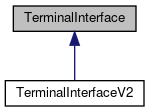Interfaces
#include <kde_terminal_interface.h>

Public Member Functions | |
| virtual | ~TerminalInterface () |
| virtual void | sendInput (const QString &text)=0 |
| virtual void | showShellInDir (const QString &dir)=0 |
| virtual void | startProgram (const QString &program, const QStringList &args)=0 |
Detailed Description
TerminalInterface is an interface implemented by KonsolePart to allow developers access to the KonsolePart in ways that are not possible through the normal KPart interface.
Note that besides the functions below here, KonsolePart also has some signals you can connect to. They aren't in this class cause we can't have signals without having a QObject, which TerminalInterface is not.
These are some signals you can connect to: void currentDirectoryChanged(const QString& dir);
See the example code below for how to connect to these.
Use it like this:
Definition at line 85 of file kde_terminal_interface.h.
Constructor & Destructor Documentation
|
inlinevirtual |
Definition at line 88 of file kde_terminal_interface.h.
Member Function Documentation
|
pure virtual |
This sends.
- Parameters
-
text as input to the currently running program..
|
pure virtual |
|
pure virtual |
This starts program, with arguments args.
The documentation for this class was generated from the following file:
Documentation copyright © 1996-2020 The KDE developers.
Generated on Mon Jun 22 2020 13:27:02 by doxygen 1.8.7 written by Dimitri van Heesch, © 1997-2006
KDE's Doxygen guidelines are available online.
 KDE API Reference
KDE API Reference